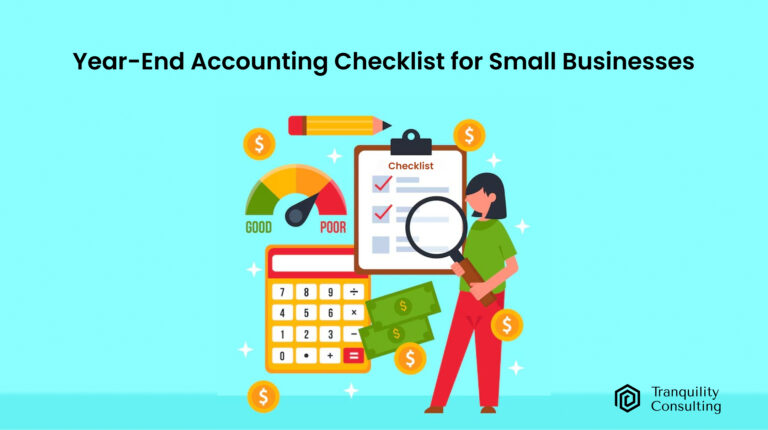As the year draws to a close, small businesses should take time to assess their financial position and prepare for the upcoming year. A year-end accounting checklist is a valuable tool that ensures all aspects of a business’s finances are reviewed and ready for tax preparation and planning. This process helps small business owners maintain accuracy in financial records, make informed decisions, and set up a solid foundation for the new year. Here’s a comprehensive year-end accounting checklist for small businesses covering essential tasks such as reviewing financial statements, reconciling bank accounts, and assessing inventory and fixed assets. Following these steps can make the transition into the new year smoother and more financially secure.
1. Review Financial Statements
One of the first steps in year-end accounting is thoroughly examining financial statements. These statements include the income statement, balance sheet, and cash flow statement, and they provide a snapshot of the business’s financial health.
- Income Statement: Reflects revenue and expenses, showing net profit or loss for the year.
- Balance Sheet: Lists assets, liabilities, and equity at a given time.
- Cash Flow Statement: This statement highlights cash movement and shows how much cash is available for operations, investments, and financing activities.
Carefully analyzing these reports helps identify any areas needing adjustment and ensures they accurately represent the business’s financial position.
2. Reconcile Accounts
Next, it’s time to reconcile bank accounts, credit card accounts, and accounts receivable and payable. Bank account reconciliation involves comparing financial records to bank statements to ensure no discrepancies. This step is essential for identifying and correcting errors, missing transactions, or unapproved charges that may have gone unnoticed throughout the year.
3. Review Accounts Receivable and Accounts Payable
Unpaid invoices can create a cash flow challenge for small businesses, so a detailed review of accounts receivable and payable is essential. For accounts receivable:
- Follow up on any outstanding invoices, and consider offering discounts for early payments to encourage clients to settle their debts before year-end.
For accounts payable, ensure all outstanding bills are accounted for and settled where possible. Reviewing these balances improves cash flow management and helps avoid surprises during tax season.
4. Inventory Assessment
An inventory assessment is necessary for year-end accounting if the business involves selling products. Conducting a physical inventory count allows verification that recorded inventory numbers match actual stock levels. This assessment also helps evaluate slow-moving or obsolete items that may need to be written off. Writing down outdated or unsellable inventory can help reduce taxable income, making it a valuable step in small business accounting.
5. Review Payroll Records
Accurate payroll records ensure that taxes are calculated and reported correctly. As part of the year-end accounting checklist, review all employee payroll information, including:
- Employee earnings, tax withholdings, and deductions.
- Bonuses or commissions may need to be processed before the year’s end.
Verifying payroll records at the year-end also helps identify errors that may impact employee taxes or tax filings. Ensuring year-end payroll summaries match accounting records is essential to avoid future complications.
6. Review Fixed Assets and Depreciation
Fixed assets, such as equipment, machinery, and property, depreciate over time. Reviewing fixed assets and depreciation allows updates on records for any new assets acquired, sold, or disposed of, as well as the current depreciation status. Properly tracking depreciation is not only required for tax purposes but also offers insight into the actual value of business assets.
If an accounting software system is used, depreciation can often be calculated automatically. Confirming these calculations are accurate and aligned with financial statements ensures a seamless year-end accounting process.
7. Assess Financial Goals and Budget for the Next Year
With the previous year’s financials, use this information to assess the business’s overall performance and set new financial goals and budget projections. This part of the year-end accounting checklist encourages evaluation:
- Financial trends from the past year.
- Opportunities for growth or cost reduction.
- Revenue and profit goals for the upcoming year.
A clear budget helps guide business decisions in the new year and ensures financial targets align with strategic goals.
Conclusion
Completing a year-end accounting checklist helps close the books accurately and prepares the business for a fresh start. Reviewing financial statements, reconciling accounts, assessing inventory, and setting financial goals for the coming year positions small businesses for ongoing success and profitability. Regularly practicing this small business accounting process can also reduce the risk of surprises during tax season, providing peace of mind and a clearer financial outlook.
FAQs
- Why is a year-end accounting checklist essential for small businesses?
A year-end accounting checklist helps small businesses ensure accurate financial records, prepare for tax season, and provide insight for future budgeting and growth. - What are the main elements to review in year-end financial statements?
The income statement, balance sheet, and cash flow statement include a snapshot of revenue, expenses, assets, liabilities, and cash flow. - How does reconciling accounts help in year-end accounting?
Bank account reconciliation detects discrepancies, errors, and unauthorized charges, ensuring accurate financial reporting and avoiding issues during tax preparation. - Why is it necessary to review accounts receivable and payable?
Reviewing accounts receivable and payable helps maintain healthy cash flow, ensuring collections and payments are current before the year ends. - How can Tranquility Consulting assist with year-end accounting for small businesses?
Tranquility Consulting offers expert support in year-end accounting closure, ensuring accurate financial records and tax optimization strategies to minimize liabilities. This helps small businesses close out the year efficiently and strategically.
If you have any questions or need business-related tax consulting advice, please contact us at: [email protected]





